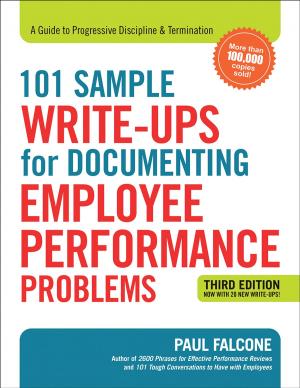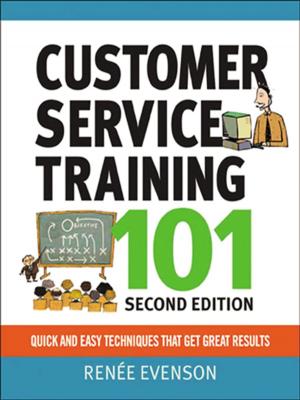Productive Performance Appraisals
Business & Finance, Management & Leadership, Management, Human Resources & Personnel Management| Author: | Paul Falcone, Randi Sachs | ISBN: | 9780814400616 |
| Publisher: | AMACOM | Publication: | March 14, 2007 |
| Imprint: | AMACOM | Language: | English |
| Author: | Paul Falcone, Randi Sachs |
| ISBN: | 9780814400616 |
| Publisher: | AMACOM |
| Publication: | March 14, 2007 |
| Imprint: | AMACOM |
| Language: | English |
When not handled correctly, performance appraisals can turn into nerve-wracking confrontations. If employees and managers aren't on the same page about expectations and performance, the working relationship can be seriously harmed. Productive Performance Appraisals gives readers all the easy-to-use tools they need to conduct an effective review -- including sample dialogs, checklists, and forms. The book shows readers how to: * plan and organize the appraisal session * set short- and long-term goals * elicit the employee's input * handle problems and "sticky" subjects such as promotions and disagreements. Now completely updated, the book has new sections on rating employees, justifying scores, and weaving disciplinary language into the review. Readers will also find guidance on developing career plans, keeping consistent records, communicating changes in roles, how reviews are used when determining layoffs, and much more.
When not handled correctly, performance appraisals can turn into nerve-wracking confrontations. If employees and managers aren't on the same page about expectations and performance, the working relationship can be seriously harmed. Productive Performance Appraisals gives readers all the easy-to-use tools they need to conduct an effective review -- including sample dialogs, checklists, and forms. The book shows readers how to: * plan and organize the appraisal session * set short- and long-term goals * elicit the employee's input * handle problems and "sticky" subjects such as promotions and disagreements. Now completely updated, the book has new sections on rating employees, justifying scores, and weaving disciplinary language into the review. Readers will also find guidance on developing career plans, keeping consistent records, communicating changes in roles, how reviews are used when determining layoffs, and much more.















